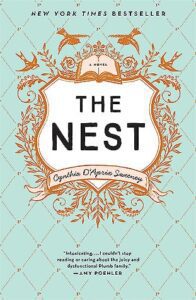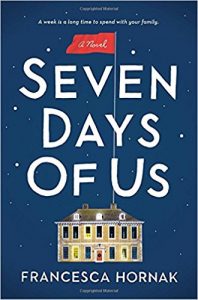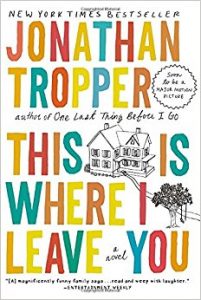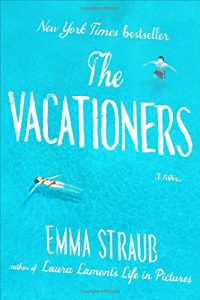Title: The Nest
Author: Cynthia D’Aprix Sweeney
Page Count: 353 pages
Genre: Contemporary Lit, Dysfunctional Family Fiction
Tone: Sardonic, Moving
Summary:
Years of simmering tensions finally reach a breaking point after an ensuing accident endangers the Plumbs’ joint trust fund, which they are months away from finally receiving. Brought together as never before, Leo, Melody, Jack, and Beatrice must grapple with old resentments, present-day truths, and the significant emotional and financial toll of the accident, as well as finally acknowledge the choices they have made in their own lives.
SPOILER WARNING: These book discussion questions are highly detailed and will ruin plot points if you have not read the book.
The Library is happy to share these original questions for your use. If reproducing, please credit with the following statement: 2017 Mount Prospect Public Library. All rights reserved. Used with Permission.
1. Is this book funny? Is it romantic (in world-view)? One review compared it to Nancy Meyers movies – (e.g., Something’s Gotta Give, It’s Complicated); would you agree?
2. Multiple reviews compared the opening chapter in some way to a movie-ready hook with action, sex, and drama. Was this an effective way to set the story in motion? Did you find it irresistible or off-putting?
3. In an interview with BookPage, Sweeney says she’s always described the book as being about family and that it surprised her to hear it described by other people as a book about money. Does it surprise you that she didn’t predict others’ perception?
4. In that same conversation, Sweeney points out the book has given people the opportunity to talk about something that is important in everyone’s life but rarely discussed in public. In your opinion, is this true?
5. Did you happen to learn the idea that sparked this book?
… she got the idea for the book while walking through Manhattan one day, on her way to meet her own family for brunch. “I was noticing all of these people sitting in the window with their drinks, on every street corner,” she says. “And I just had an image in my head of family members who are about to get together, but they’re having a separate drink …and the image really stuck with me. And I just started thinking about who the people would be and why they needed courage to see one another, and why they couldn’t drink in front of one of another, and what was difficult about this meeting they were about to have. And once I started started answering those questions, that’s how the story started to take shape. (NPR: All Things Considered)
What did the moments in the story prior to the lunch meeting reveal about each character?
6. Did you like spending time with the characters? Does that matter? Were there those you were more excited to read about or with whom you could better identify?
7. Were the siblings wrong to make plans for the anticipated money? Do you blame them?
From The Washington Post: An organization called Wealth-X (world’s leading ultra-high net worth intelligence firm) issued report about what it calls “looming wave of wealth transfers”. Baby Boomers are expected to bequeath some $16 trillion to their children over the next three decades…For rich, this holds little suspense, but for upper-mid-class Americans balancing mortgage payments, tuition bills, and retirement plans on a brittle tower of monthly paychecks, this bounty looms with the promise of salvation.
Does this frame change your answer at all?
8. Is Leo believable as a character? Do you have any sympathy for him?
9. Are the Plumb characters well-rounded?
10. What about the siblings’ partners? Are the non-Plumb characters too idyllic?
11. Many readers express an affinity for Stephanie. Why do you think that is? Were you rooting for her and Leo to be together? Would you have wanted to read even more about her?
12. What about the subplots with Miranda, Vinnie, and Tommy? Were you invested in these stories as much as those of the Plumbs?
13. The New York Times Book Review piece on The Nest opens with this line: “’The Nest’ is a novel in the Squabbling Sibling genre.” Do you think of this as a genre?
14. Another behind-the-scenes tidbit:
Cynthia D’Aprix Sweeney’s agent sent her novel to publishers the Monday after Thanksgiving. As readers who had likely spent long weekends with their own dysfunctional families, he told her, they would be especially receptive to her book’s dysfunctional Plumb clan. The plan worked, and the 55-year-old’s debut landed a seven-figure advance. (The Atlantic)
Do you admire the calculated timing, or does it seem coincidental? In your opinion would the book have been just as well received without the proximity to the holidays?
15. The Nest is about a group of privileged group of people – upper-middle-class white siblings – yet would you say that it is successful in touching on issues more universal? How so?
16. It’s also been described as a “New York novel”, a category that though lauded in literary circles is criticized for being too navel-gazing (esp. with authors and agents included!). Would you place it in this category? What makes it so? What transcends those boundaries?
17. The Nest is about inheritance, and upon hearing that word we immediately think of money, objects, or property. What about the intangibles we inherit from family? Consider the siblings and what is illustrated about how we inherit a place in a family and all that entails. What do you think?
18. Walker is fascinated that a group of adults could use the term ‘the Nest’ in all “earnestness and never even casually contemplate the twisted metaphor of the thing, and how it related to their dysfunctional behavior as individuals and a group.”(260) What did he mean?
19. Walker also observes that the issue with Leo and the money sparked a different dynamic between the siblings, that they were “making casual forays into one another’s lives”…and held out hope that they might ”…move on, try to forge relationships with one another that weren’t about the inheritance.”(261) Did you notice this, too? Do you think this would have happened without the situation with Leo?
20. Late in the book, Melody asks, “when did Leo start hating us?…How was it so easy for him to leave?…Was it really just about money? Was it about us?”(291) We’ve seen things from Leo’s perspective; can we answer those questions?
21. How did the scenes with Louisa and Nora add to the overall story? What, if anything, do the sisters – both individually and together (esp. as twins!) illuminate regarding family and individual dynamics? Did you see these forays into the ‘next’ generation as distraction or complements?
22. Melody has an epiphany about herself (with Walt’s help) at the Chinese restaurant outing (300). Do you remember what she realized? Do you think her life will be different going forward?
23. How did you feel about the final scenes of looking for Leo? About the scene from Leo’s perspective? Should Paul or Bea or Leo have acted differently? Did you understand their actions?
24. Were you hoping that Leo would redeem himself? Does the author’s choice seem believable?
25. Did the epilogue resolve everything a little too neatly, or did you find it satisfying?
26. NYT Critic “Janet Maslin argued that the primary flaw of the novel was that it was unable to break out of the tropes of dysfunctional family literature.” Would you agree? Whether or not you agree, did this affect your experience of the book?
27. One book podcast recommended this title for a woman who doesn’t read but who loves reality TV such as the Real Housewives franchise. In your opinion, is this a good fit?
28. To whom might you recommend this book?
Want help with your book discussion group? Check out tips, advice, and all the ways the Library can help support your group!
OTHER RESOURCES:
- website of author Cynthia D’Aprix Sweeney
- LitLovers discussion guide of The Nest
- MPPL-created character map (contains mild spoilers)
- from NPR: “Humor and Heart Fill The Nest“
- “In The Nest, a Family Pot to Split Sets Sibling Relations to a Slow Boil” via The New York Times
- “The Nest: A Tale of Family, Fortune, and Dysfunction” via The Atlantic
READALIKES:
Seven Days of Us
by Francesca Hornak
This Is Where I Leave You
by Jonathan Tropper
The Vacationers
by Emma Straub





